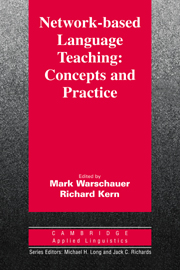Book contents
- Frontmatter
- Contents
- List of contributors
- Series editors' preface
- Preface
- 1 Introduction: Theory and practice of network-based language teaching
- 2 Sociocollaborative language learning in Bulgaria
- 3 On-line learning in second language classrooms: An ethnographic study
- 4 Negotiation in cyberspace: The role of chatting in the development of grammatical competence
- 5 Writing into change: Style shifting in asynchronous electronic discourse
- 6 Computers and collaborative writing in the foreign language curriculum
- 7 Networked multimedia environments for second language acquisition
- 8 An electronic literacy approach to network-based language teaching
- 9 Task-based language learning via audiovisual networks: The LEVERAGE project
- 10 Is networked-based learning CALL?
- Name index
- Subject index
3 - On-line learning in second language classrooms: An ethnographic study
Published online by Cambridge University Press: 05 October 2012
- Frontmatter
- Contents
- List of contributors
- Series editors' preface
- Preface
- 1 Introduction: Theory and practice of network-based language teaching
- 2 Sociocollaborative language learning in Bulgaria
- 3 On-line learning in second language classrooms: An ethnographic study
- 4 Negotiation in cyberspace: The role of chatting in the development of grammatical competence
- 5 Writing into change: Style shifting in asynchronous electronic discourse
- 6 Computers and collaborative writing in the foreign language curriculum
- 7 Networked multimedia environments for second language acquisition
- 8 An electronic literacy approach to network-based language teaching
- 9 Task-based language learning via audiovisual networks: The LEVERAGE project
- 10 Is networked-based learning CALL?
- Name index
- Subject index
Summary
The great enthusiasm about the potential of computer networks for language learning has not yet been matched by research on what actually occurs in on-line classrooms. Much of the published literature on the topic consists of anecdotal teacher reports. The small number of systematic studies that have been published have reported on narrow slices of data, such as the outcome of particular class sessions (e.g., Kern, 1995) or students' use of particular discourse features (e.g., Chun, 1992). Yet, language learning is a complex social and cultural phenomenon, even more so when it involves new technologies that connect the classroom to the world. Short-term quantitative studies may fail to account for the complex interaction of social, cultural, and individual factors that shape the language learning experience. Researchers in education and applied linguistics are increasingly turning to interpretative qualitative approaches, such as ethnography (see, for example, the fall 1995 special issue of TESOL Quarterly), but thus far few ethnographic studies have been conducted on uses of technology in the language classroom.
This chapter reports on a 2-year ethnographic study of on-line learning in four college language and writing classrooms in Hawaii. I undertook the study in order to attempt to achieve a holistic, contextualized understanding of the actual implementation of on-line learning. By immersing myself over a prolonged period in the culture of the classrooms and institutions, I sought to determine “the immediate and local meanings of actions, as defined from the actors' point of view” (Erickson, 1986, p. 119; emphasis in original).
- Type
- Chapter
- Information
- Network-Based Language Teaching: Concepts and PracticeConcepts and Practice, pp. 41 - 58Publisher: Cambridge University PressPrint publication year: 2000
- 46
- Cited by



